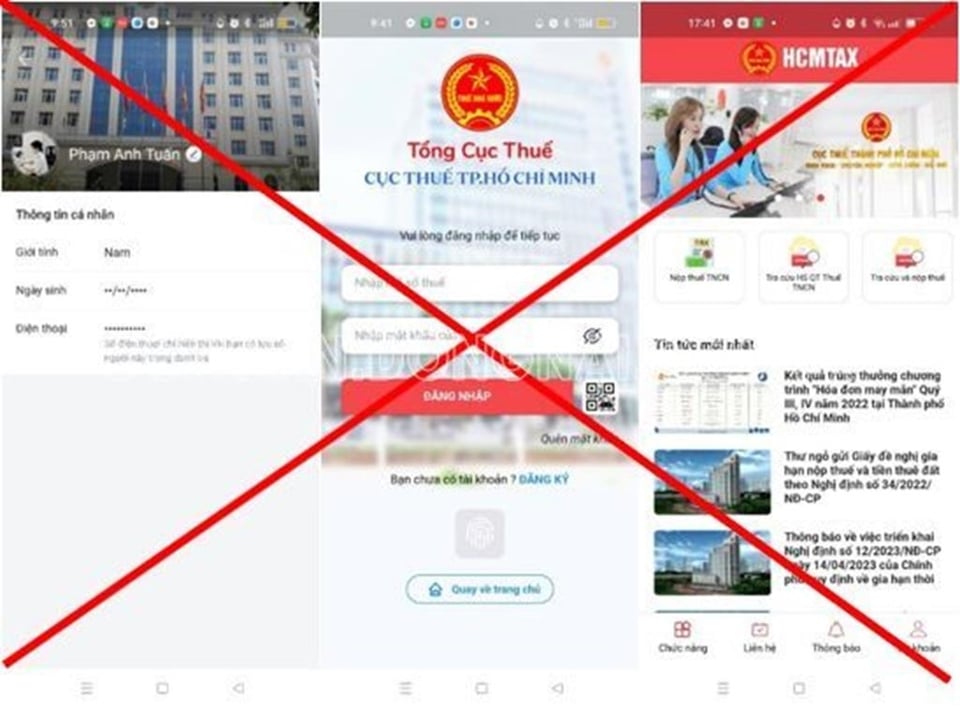According to the Information Security Department (Ministry of Information and Communications), despite continuous warnings from authorities and media outlets nationwide, the number of victims of online scams continues to increase.
Statistics show that, cumulatively up to June, the Cybersecurity Department had blocked 3,170 online phishing websites, protecting nearly 11 million people from fraudulent and illegal websites.

Simultaneously, through the National Cybersecurity Portal, this agency is also regularly updating information on information security, especially online fraud, to help people improve their ability to recognize various forms of fraud. Below are 6 fraudulent schemes commonly used by perpetrators during week 30 of 2024, from July 22nd to July 28th:
Scammed out of 5.6 billion VND due to greed for profit from playing games.
A woman in Thanh Hoa province was recently scammed by online fraudsters who lured her into playing a game with prizes. Specifically, an acquaintance online introduced himself as an IT employee in Hanoi who claimed to know about a system vulnerability in the game. Therefore, if players deposited money into the system during two time slots – 3 PM - 3:30 PM and 8 PM - 8:30 PM daily – they would win big. Despite her suspicions, the victim created an account to try the game. After earning nearly 53 million VND in her first participation, the victim continuously deposited money and was ultimately defrauded of a total of 5.6 billion VND by the scammers.
The Information Security Department advises people not to trust individuals they only meet through social media; not to transfer money to others without knowing the identity and location of the account holder; and to regularly check and update security features and privacy access on websites. People should also not provide personal information or bank account details to strangers; and should not access pages, links, or data files from unknown or unofficial sources.
Impersonating Vietnam Social Security to trick people into installing fake VssID apps.
Vietnam Social Security (VSS) recently warned about the falsification of documents and impersonation of the agency, requesting updates to the VssID 4.0 application to steal personal information and accounts, causing financial losses to citizens and damaging the reputation of the social security sector.
Specifically, the scammers forged documents, impersonating the Vietnam Social Security (BHXH) to request provincial Social Security offices to urgently implement the new VssID 4.0 application update. In reality, they tricked people into installing a fake VssID app, then stole personal information, gained control of their phones, and subsequently misappropriated their assets.
To promptly prevent fraudulent activities and address impersonation, the Cybersecurity Department recommends that citizens raise their awareness and understanding of various forms of fraud and how to avoid them. If you receive any requests related to social insurance, please contact the social insurance agency directly via their official phone number and email address to verify the information. Citizens should also avoid clicking on links or calling phone numbers provided in suspicious notifications; do not share personal information or bank account details via email, text message, or phone unless you have verified that the source is reliable.
Warning about fraudulent activities impersonating the General Department of Taxation's website.
The Information Security Department reports that, according to information from the Phu Yen Tax Department, a fake website impersonating the General Department of Taxation's website has recently appeared on the internet. With the domain name 'tracuutthvt.com', this fake website uses the interface and logo of the General Department of Taxation and the image of the National Cybersecurity Monitoring Center (NCSC), causing confusion among many taxpayers.
Affirming that the General Department of Taxation has only one domain name, gdt.gov.vn, the agency also stated that it has requested relevant authorities to take measures to handle fake websites. Given the increasingly sophisticated nature of scams, the Information Security Department advises citizens to equip themselves with the skills to recognize and prevent impersonation and website fraud. Users should check security certificates, verify the legitimacy of websites, and only access services and information from the General Department of Taxation through official channels; avoid clicking on suspicious links or emails; refrain from providing personal information on websites of unknown origin; and use security tools to warn against and block fake websites.
Scams impersonating television programs to steal money.
Exploiting parents' desire to enroll their children in the "Vietnamese Language Champion" program organized by VTV, scammers created a "support group" via Facebook Messenger, which included accounts impersonating VTV coordinators and the "disbursement support department" of the Vietnam National Credit Information Center (CIC).
When someone registers, the scammers request payment of various fees such as program participation fees, system fees, and other incidental expenses. However, after receiving the money, the scammers inform the parents that the money is stuck in the system because they entered the wrong 'command code'. Many parents have repeatedly transferred money hoping to recover their lost funds. Reports indicate that some parents have been scammed, with some cases involving losses of billions of VND.
The Cybersecurity Department recommends that people be cautious when sharing personal information with service providers. If you receive calls or messages claiming to be from representatives of agencies or organizations, inviting, requesting, threatening, or coercing you to transfer money or perform other tasks, absolutely do not believe them or comply. When using online products and services, people should thoroughly check information about the product, service, and provider through multiple sources. If you have fallen victim to a scam or suspect you have been scammed, you should report the incident to the police and consumer protection organizations.
Beware of scams related to the Paris 2024 Olympics.
Many unscrupulous individuals are exploiting the ongoing Paris 2024 Olympics to create misleading promotional videos , emails, and text messages to reach and entice people with the aim of defrauding them and stealing their money.
Among these, a common form of fraud is the scam involving fake ticket sales websites. Scammers approach people through advertisements, text messages, or emails inviting them to buy tickets, often with attached fake websites.
The fact that Olympic tickets are often distributed by multiple parties has inadvertently created opportunities for scammers to create fake websites. Olympic tickets can also be sold through black market groups on social media; taking advantage of buyers' gullibility, these scammers request victims to transfer deposits, then block and cut off all communication.
In addition, the perpetrators also committed fraud by sending text messages and emails recruiting staff for work during the Olympic Games.
The Cybersecurity Department recommends that people be vigilant against messages and emails containing content related to the Paris 2024 Olympic Games; do not click on advertisements or attached links.
Sending requests for payment of fines is a trick to steal personal information.
Recently, several Chicago residents reported receiving text messages demanding payment for illegal parking. These messages often include links to fake websites, requesting personal information such as name, address, ZIP code, date of birth, and credit card details. This is crucial data used by scammers to carry out sophisticated fraudulent schemes.
In response to this type of scam, the Cybersecurity Department advises domestic users to be vigilant against messages requesting payment of fines in any field. For administrative violation fees, citizens should only pay fines directly at the State Treasury, commercial banks where the State Treasury has an account, public postal service providers, or authorized fine collection agencies as prescribed by law. When receiving messages requesting payment of fines, citizens should calmly verify the information with the competent state agencies or units via official phone numbers or websites.
Source: https://kinhtedothi.vn/ngan-chan-3-170-website-lua-dao-truc-tuyen.html














































































































Comment (0)